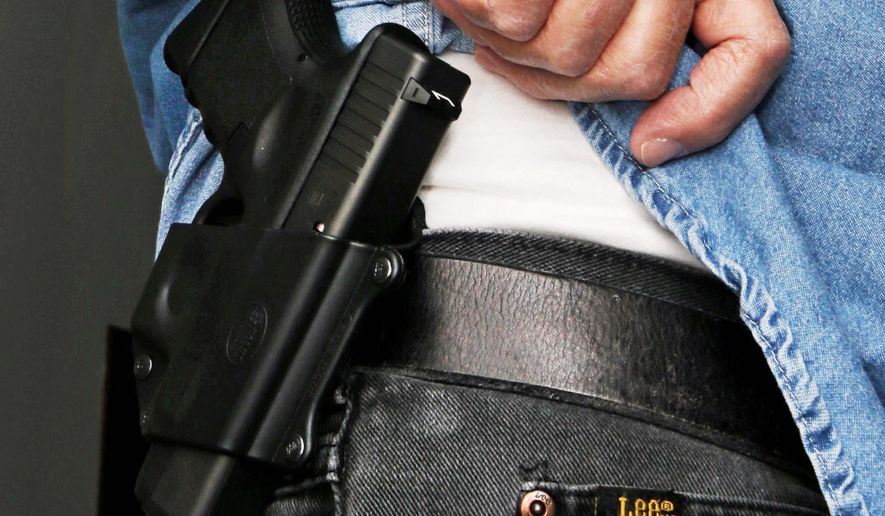A federal appeals court let stand Thursday a decision that it is unconstitutional to require firearms owners prove a “good reason” in order to carry legally a concealed handgun in the nation’s capital — a win for gun rights advocates that has the potential to send a significant Second Amendment case to the Supreme Court.
The D.C. government had petitioned for the full U.S. Court of Appeals for the D.C. Circuit to rehear a lawsuit against the city’s gun laws, but the court declined to revisit the 2-1 decision handed down earlier this year, noting that none of the 10 judges who considered the matter requested a vote on it.
The decision leaves in place the D.C. Circuit’s prior ruling, which found that the city’s “good reason” requirement was unconstitutional.
It also sets up the potential for the Supreme Court to take up the case as the decision creates a split with four other federal circuits that have found discretionary permitting schemes elsewhere are legal.
“Sometimes the most important thing a court does is not do anything,” said Adam Winkler, a University of California, Los Angeles law professor who has written extensively on the Second Amendment. “Because of what the D.C. Circuit didn’t do today, the Supreme Court is now far more likely to take a concealed carry case.”
D.C. Attorney General Karl Racine said he was disappointed in Thursday’s decision but had not decided yet whether his office would appeal it to the Supreme Court.
“As we review options for the next steps in consultation with the mayor, the council and the Metropolitan Police Department, our primary concern will be ensuring public safety through reasonable gun laws,” Mr. Racine said.
But the circuit split created by the D.C. ruling is the type of scenario for which gun rights activists have salivated for years, with the hope that the Supreme Court would take up a case on concealed carry and rule to expand Second Amendment protections. Four other federal appeals courts have upheld similar restrictions.
The city’s law had required gun owners to prove they have a “good reason to fear injury” or another “proper reason,” such as a job that requires carrying large amounts of cash or valuables, in order to get a concealed carry permit. Under the city’s law, living in a high-crime neighborhood was not reason enough to justify approval of a concealed carry permit.
Second Amendment advocates who brought the lawsuit said the city’s law was so restrictive that most law-abiding citizens would be unable to obtain permits. As of June, the Metropolitan Police Department reported having granted just 125 concealed carry permits since the law took effect in 2014.
The city’s strict concealed carry laws have remained in effect while the D.C. Circuit was considering whether to rehear the case, so the ruling marks the first time the “good reason” requirements will be cast aside.
Mr. Racine said the requirement will remain in effect until the D.C. Circuit issues a mandate effectuating the ruling, which will likely take a week. All other city regulations regarding concealed carry permits will remain in place, meaning gun owners will still have to complete carry permit applications, pay applicable fees for permits and complete gun safety training requirements.
Attorney Alan Gura, who argued the case for some of the gun owners involved, said the ruling should force city leaders to give their attitude toward gun rights a hard look.
“Ten years ago, Washington D.C.’s political leadership tried to extinguish Second Amendment rights before the Supreme Court,” Mr. Gura said in a statement. “The result was D.C. v. Heller, a tremendous victory for the rights of all Americans. With the court of appeals again confirming the people’s right to bear arms, Washington, D.C.’s politicians must once again ask themselves whether it makes sense to keep resisting our fundamental rights.”
The ruling is the latest blow to the District’s efforts to curtail gun possession and use. The Supreme Court struck down the city’s near-total ban on firearms possession in 2008, and a federal court blocked an effort to ban the carrying of firearms in public in 2014.
D.C. lawmakers adopted the restrictive concealed carry regulations in response to the 2014 ruling, saying the particular firearms regulations were necessary to provide security in a densely populated city that is home to numerous high-ranking federal officials and regularly hosts high-profile dignitaries and large-scale protests.
Alan Gottlieb, the founder of the Second Amendment Foundation, said the group would like to see the concealed carry issue resolved in their favor at the Supreme Court because it would set national precedent.
“We have a win now and a chance for a bigger win,” he said. “But since we don’t get to control it, it’s up to D.C. now and we will wait and see.”
But Mr. Winkler said the significance of the D.C. Circuit ruling couldn’t be overstated.
“If the Supreme Court were to agree with D.C., it would mean a huge number of guns on the streets of major cities like Washington, D.C., and Los Angeles,” he said. “It could have a very big impact on gun policy.”
• Andrea Noble can be reached at anoble@washingtontimes.com.




Please read our comment policy before commenting.